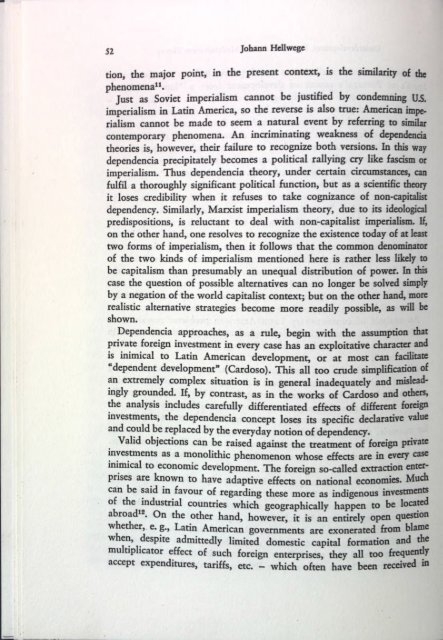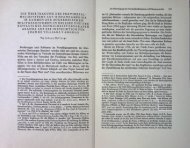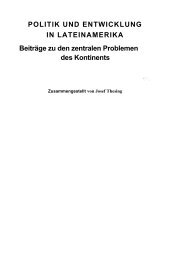9_Law and State_Volume 17
Create successful ePaper yourself
Turn your PDF publications into a flip-book with our unique Google optimized e-Paper software.
5 2 Johann Hellwege<br />
tion, the major point, in the present context, is the similarity of the<br />
phenomena11.<br />
Just as Soviet imperialism cannot be justified by condemning U.S.<br />
imperialism in Latin America, so the reverse is also true: American imperialism<br />
cannot be made to seem a natural event by referring to similar<br />
contemporary phenomena. An incriminating weakness of dependenria<br />
theories is, however, their failure to recognize both versions. In this way<br />
dependencia precipitately becomes a political rallying cry like fascism or<br />
imperialism. Thus dependencia theory, under certain circumstances, can<br />
fulfil a thoroughly significant political function, but as a scientific theory<br />
it loses credibility when it refuses to take cognizance of non-capitalist<br />
dependency. Similarly, Marxist imperialism theory, due to its ideological<br />
predispositions, is reluctant to deal with non-capitalist imperialism. If,<br />
on the other h<strong>and</strong>, one resolves to recognize the existence today of at least<br />
two forms of imperialism, then it follows that the common denominator<br />
of the two kinds of imperialism mentioned here is rather less likely to<br />
be capitalism than presumably an unequal distribution of power. In this<br />
case the question of possible alternatives can no longer be solved simply<br />
by a negation of the world capitalist context; but on the other h<strong>and</strong>, more<br />
realistic alternative strategies become more readily possible, as will be<br />
shown.<br />
Dependencia approaches, as a rule, begin with the assumption that<br />
private foreign investment in every case has an exploitative character <strong>and</strong><br />
is inimical to Latin American development, or at most can facilitate<br />
dependent development” (Cardoso). This all too crude simplification of<br />
an extremely complex situation is in general inadequately <strong>and</strong> misleadingly<br />
grounded. If, by contrast, as in the works of Cardoso <strong>and</strong> others,<br />
the analysis includes carefully differentiated effects of different foreign<br />
investments, the dependencia concept loses its specific declarative value<br />
<strong>and</strong> could be replaced by the everyday notion of dependency.<br />
Valid objections can be raised against the treatment of foreign private<br />
investments as a monolithic phenomenon whose effects are in every case<br />
inimical to economic development. The foreign so-called extraction enterprises<br />
are known to have adaptive effects on national economies. Much<br />
can be said in favour of regarding these more as indigenous investments<br />
of the industrial countries which geographically happen to be located<br />
abroad1-. On the other h<strong>and</strong>, however, it is an entirely open question<br />
whether, e. g., Latin American governments are exonerated from blame<br />
when, despite admittedly limited domestic capital formation <strong>and</strong> the<br />
multiplicator effect of such foreign enterprises, they all too frequently<br />
accept expenditures, tariffs, etc. - which often have been received in
















